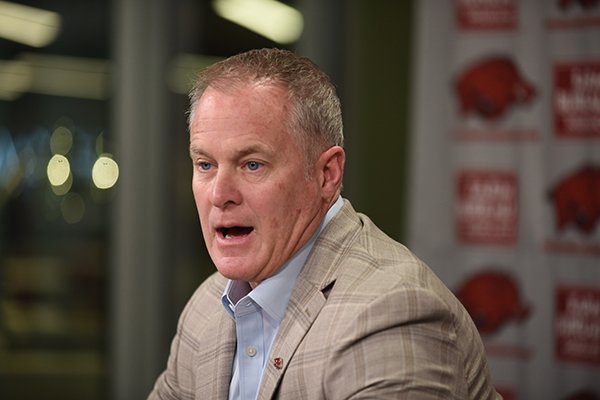LITTLE ROCK — Boxed in by a firing, fine print and SEC foes, Arkansas has no choice but to include a hefty buyout or some other sort of guarantee for its next football coach.
How about breaking the mold and offering ironclad employment rather than emolument? Such an approach would not only be more palatable to fans and big donors than paying millions of dollars to a coach who fails, but also provide a realistic amount of time for the new coach to meet expectations.
Hunter Yurachek acted appropriately when he ended an unmitigated disaster with two games remaining in Chad Morris’ second season as head coach and he is not the only one to take decisive action this month. Hired about the same time as Morris, Florida State coach Willie Taggart was fired after compiling a 9-12 record. The buyout for the remainder of his six-year contract is more than $17 million, about 70 percent more than the amount owed Morris.
Not that long ago, it was understood that a coach hired to resurrect a program would need three or four years, minimum. These days, patience is in short supply.
That said, Yurachek’s decision sends a clear message to coaching candidates that the athletics director is capable of pulling the plug at any time.
To that end, when a coach’s agent is in discussions with Yurachek, cites the Morris firing and demands a big buyout to protect his client against two and done, the AD could counter with a contract that says the coach will be safe for a specific number of years.
All involved in the next hire know that the paltry $3 million salary of Missouri’s Barry Odom is the lowest in the 14-team SEC and only a starting point. Half the top 10 highest paid college football coaches in the country are in the SEC and make $6 million minimum.
Morris was paid $3.5 million per year.
Arkansas, Yurachek said recently, “will pay what we need to pay to get the best person to take this position.”
In that atmosphere, paying a new coach $4 million annually with the first four years of a five-year contract guaranteed makes as much sense as paying $3.5 million per year, firing him after a couple years and handing him an extra $10 million as a going away gift.
Guaranteeing four years comes with a risk, but no more so than asking a new coach to compete with Alabama, LSU, Auburn and Texas A&M after two or three years on the job.
On top of that, four years in one system is more conducive to success than starting over after two years.
Also in play is the fact that both sides know the new guy will be playing catch-up in recruiting because of a late start and lost commitments.
Hired in December 2017, only weeks before the first-ever early signing date, Morris was in a similar situation and his first recruiting class — ranked No. 51 by ESPN — totaled only 17 athletes.
That year, two-thirds of the top 100 recruits in the nation and almost 80 percent of the class signed in December; the rest waited until the traditional signing day in February.
Some teams signed more than 90 percent of their recruits that December and, a year later, 88 of 247Sports’ composite top 100 completed the process during the early signing period — understandable because the extended wooing gets old for the pursuers and the pursued.
Adding to the built-in recruiting deficit, more than half-dozen players who committed to Arkansas reopened their recruiting after Morris was fired.
Considering those factors and the Razorbacks’ extended losing streak in the SEC, a new coach is going to need time, and a contract with job protection would acknowledge that truth. In turn, he would be more at ease redshirting players.
Already this season, Arkansas has used 22 true freshmen. Who knows how many of them would have been better off learning and lifting?
Other than the departing coach and his agent, nobody likes the big buyout, a topic worth almost 20 paragraphs recently in an editorial in the state’s largest newspaper including: “Why can’t Arkansas take the lead, and offer a contract that either has no buyout for the coach or at least allows the university to fire a coach for the offense of doing a poor coaching job? …”
In a recent news conference, Yurachek also expressed disdain for the buyouts, but added correctly that change has to be industry-wide.
“It can’t be where Arkansas takes the lead on that … or it’s going to hurt our candidate pool,” he said.
Job security is an alternative way to lead.

